EU in the New World Order after Crimea
Adelina Marini, March 19, 2014
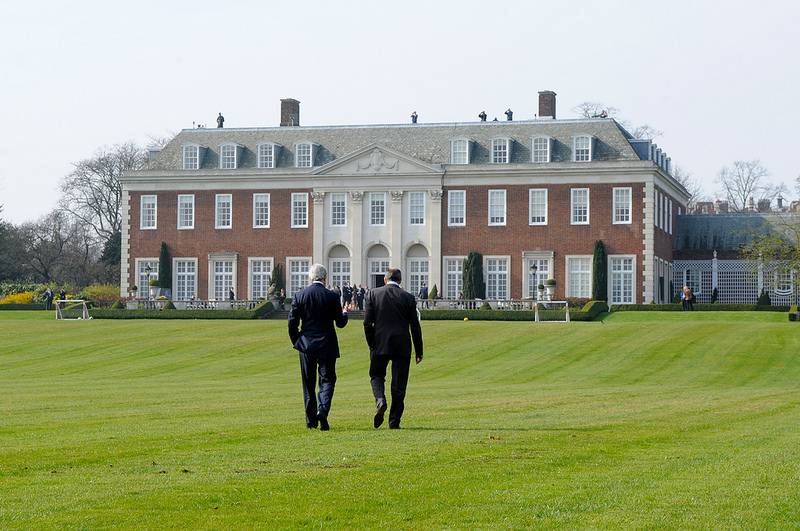 There is no doubt that after the referendum in Crimea and its annexation by Russia we are awaiting the dawn of a new world order. An order where not all countries abide to international treaties, laws and order, where there is a new wave of authoritarianism in strategic countries. Is the European Union prepared for such a world order? Not in the least - neither legally nor mentally. In the course of almost 10 years the Union was working on drafting a new treaty that was supposed to respond to the new global challenges (the fall of the Berlin wall, globalisation) and most of all its enlargement. The treaty from Lisbon entered into force on December 1st, 2009, right before the beginning of the biggest crisis in the Community ever since its establishment - the euro area debt crisis - which questioned the vitality of the biggest integrationist step at the time - the common currency.
There is no doubt that after the referendum in Crimea and its annexation by Russia we are awaiting the dawn of a new world order. An order where not all countries abide to international treaties, laws and order, where there is a new wave of authoritarianism in strategic countries. Is the European Union prepared for such a world order? Not in the least - neither legally nor mentally. In the course of almost 10 years the Union was working on drafting a new treaty that was supposed to respond to the new global challenges (the fall of the Berlin wall, globalisation) and most of all its enlargement. The treaty from Lisbon entered into force on December 1st, 2009, right before the beginning of the biggest crisis in the Community ever since its establishment - the euro area debt crisis - which questioned the vitality of the biggest integrationist step at the time - the common currency.
The agreed with so much pain deepening of the European integration in the Lisbon Treaty proved completely inadequate to what the EU clashed with. Further on the story is pretty familiar - numerous summits, numerous secondary legislative actions on behalf of the Commission, the European Parliament and the Council.
What happened with the common foreign policy?
Before the entry into force of the Lisbon Treaty, the common defence and foreign policy of the EU dealt with humanitarian and evacuation missions, conflict prevention and peace maintenance, crisis management military missions. To sum up, it was entirely targeted to a period of a global order where there is no significant confrontation among big powers but rather local conflicts. By the time, the EU's external policy was completely adequate to the level of integration within the Union. The reform the 2009 treaty has introduced, however, is very far from ambitious. It makes a cosmetic change of the name and functions of the high representative for the external policy and security and several new activities were added in the area of disarmament, stabilising operations after a conflict has ended, advisory and assistance missions in the military area. The Lisbon Treaty provides an opportunity also for the creation of "coalitions of the willing" within the Union - groups of countries that want to commit to a certain mission.
"New security challenges continue to emerge. Europe's internal and external security dimensions are increasingly interlinked. To enable the EU and its Member States to respond, in coherence with NATO efforts, the European Council calls for the development of cyber defence policy in 2014; EU maritime security strategy by June 2014; increased synergies between CSDP and freedom/Security/Justice actors to tackle horizontal issues such as illegal migration, organised crime and terrorism; progress in developing CSDP support for third states and regions, in order to help them to improve border management; further strengthening cooperation to tackle energy security challenges".
This is written down in the conclusions from the EU summit dedicated entirely on the CSDP which took place in December ... 2013. This is the first time since the entry into force of the Lisbon Treaty (December 1st, 2009) when the leaders of the member states discussed their common external and defence policy. The summit took place on December 19-20. In the beginning of this same December, the people protesting for a month in Ukraine had reached a record number - more than 800 thousand people. They had occupied the Maidan in Kiev and had turned it into a tent camp. This is a country which the EU itself says it is the key for the success of one of the sleeves of its common foreign policy - the Eastern Partnership. On December 17th, two days before the EU summit, President Putin offered a rescue loan of 15 billion dollars to Ukraine and a reduction of the gas prices by one third.
"The European Council invites the High Representative, in close cooperation with the Commission, to assess the impact of changes in the global environment, and to report to the Council in the course of 2015 on the challenges and opportunities arising for the Union, following consultations with the Member States", the conclusions from the December European Council read.
The global challenges
The changes in the global environment, however, had been visible for a long time, but no one was capable to suggest that they will go that far. It was clear, though, that the EU seriously underestimated the developments in one of its strategic policies - the eastern one. On November 21st (a month before the European summit), the then Ukrainian President Viktor Yanukovych refused to sign the Association Agreement, accompanied by an unprecedented agreement for the creation of a comprehensive free trade zone. Mr Yanukovych's move was caused by unhidden racketeering policy by Moscow. This is what unleashed the protests in Ukraine and cast a huge blow to the European efforts to associate with Ukraine. The EU believed that the agreement was the diamond in the crown of the relations with the eastern neighbours which is why the failure with its signature undermined the otherwise ambitious third summit between the EU and the Eastern Partnership countries, which took place in Vilnius on November 28-29 and which ended with a casual declaration.
On the surface it seems that the Ukrainian crisis was caused by the West not taking into account Russia's strategic interests in Sevastopol and therefore its Black Sea Fleet and over the government in Kiev and that such control would be impossible if the government were to be pro-European and were to be moving the country toward approximation with the EU, was creating a rule of law and democracy. If that was true, however, why does Moscow refuse trilateral negotiations with Brussels and, instead, is deciding the faith of the region in bilateral talks with US - just like during the Cold War. It is true that while Yanukovych was in power Putin was ready for trilateral talks with the EU but then Brussels 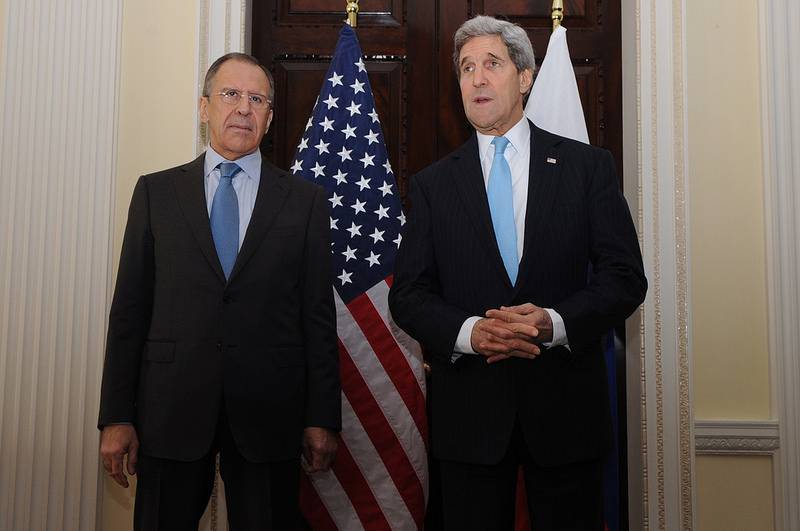 refused. Nevertheless, if the aim is simply the West to comply with harmed interests, then accumulating military power, waging a propaganda war and intimidation are totally unnecessary.
refused. Nevertheless, if the aim is simply the West to comply with harmed interests, then accumulating military power, waging a propaganda war and intimidation are totally unnecessary.
On Friday, March 14th, in London, a meeting took place between Russia's Foreign Minster Sergey Lavrov and US Secretary of State John Kerry which lasted six hours and ended with a new global reality - Russia and USA from strategic partners engaged in healing the wounds from the Cold War are now enemies. This meeting marks the formal beginning of the new Cold War which might not be that cold. The statement of the top Russian diplomat makes it clear that Russia views Ukraine as a non-sovereign country which has no right to seek assistance from the international community in forming its own future. In this way, Russia practically excludes the EU as a player which has pretences toward a shared neighbourhood.
It also became clear that to Russia the legal and actual peace the world has lived in after the end of the Cold War is no longer valid. On the occasion of the Crimea, Lavrov recalled the situation with the Comoros islands and France and said that to Russia Crimea is much more important than are the Comoros islands to France or the Falkland islands to Britain. Crimea, in fact, he said, is as special to Russia as is Kosovo to Serbia. Secretary of State John Kerry warned that the decision President Putin was about to take would have enormous consequences for the global community. And he took it - he recognised Crimea's independence and then ordered the annexation of the peninsula to the Russian Federation. But what are the enormous consequences is a question the international community is not ready to answer yet which is why it constantly hopes that the worst will be avoided.
Kerry emphasised several times that the international community and the US in particular recognise Russia's strategic interests. According to him, the West acknowledges that it was a mistake not to clearly recognise that those are "legitimate" Russian interests. One more thing emerged clearly again during the meeting in London - Russia talks to Obama, Merkel, Cameron, the Chinese, Erdogan, but not to Barroso, Ashton or Van Rompuy.
Now, where to?
In order to have a common foreign and security policy the EU should know who or/and what is the enemy and should have developed strategies how to counteract when that enemy turns into a direct threat. Russia is not an enemy in itself, but its authoritarian policy is. And that must be clearly stated in the strategies to counteract the risks to EU's security. Just as dangerous is the return of totalitarianism in the EU itself. To be able to effectively counteract to a danger such as the increase of authoritarian regimes in its closest neighbourhood (let us not forget Turkey and the countries from the Arab spring), the Union has to have a plan A to act and, very importantly, a plan B. All member states need to be aware what their strategic interests are, what will suffer the most if the worst case scenario unfolds, how this can be prevented/compensated and what the member states are willing to sacrifice.
All this should not be resolved in coalitions of the willing but unanimously and at community level. If the EU allows to be isolated from the creation of the new global order this will be the beginning of the end of the EU in the form we know today. And Russia will not be to blame for this. Simply, the Ukrainian crisis will prove to be the catalyst of a process that was planted when the EU opened its doors for countries which before that were on the dark side of the Iron Curtain. The European Union has a very passive and reactive external and defence policy the main instruments of which are declarations and statements. Decisions are being taken ad hoc, depending on the situation, and with huge delays. This has to change. The EU needs to redefine its direct and indirect risks to its common security and to make a comprehensive review of its strategic policies.
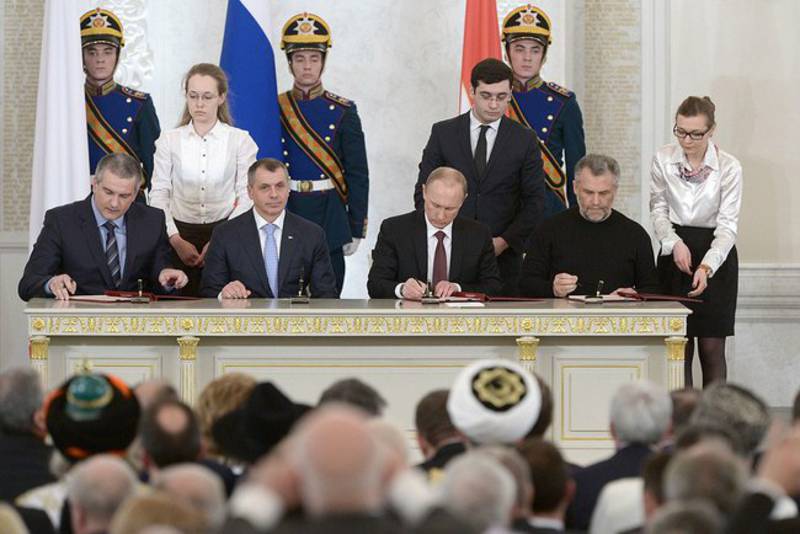 For such a process, but only for the Eastern Partnership, called the European Parliament in a resolution adopted on March 12th in the European Parliament. It calls for a deep assessment of the efficiency of the Eastern Partnership, including in terms of successes and failures. It is also called to consider the way forward and to come up with a clear vision about the future. The EU should do that as quickly as possible while, in the same time, discusses how to make its common foreign and defence policy more efficient. As I recently wrote, the EU needs to think on what basis it should develop its relations with Russia. This, according to Vesna Pusic, Croatia's first deputy premier and minister for foreign and European affairs, is already an issue in the EU. The problem is, as she said, that all politicians today have built their political careers on the basis of increasing partnership with Russia.
For such a process, but only for the Eastern Partnership, called the European Parliament in a resolution adopted on March 12th in the European Parliament. It calls for a deep assessment of the efficiency of the Eastern Partnership, including in terms of successes and failures. It is also called to consider the way forward and to come up with a clear vision about the future. The EU should do that as quickly as possible while, in the same time, discusses how to make its common foreign and defence policy more efficient. As I recently wrote, the EU needs to think on what basis it should develop its relations with Russia. This, according to Vesna Pusic, Croatia's first deputy premier and minister for foreign and European affairs, is already an issue in the EU. The problem is, as she said, that all politicians today have built their political careers on the basis of increasing partnership with Russia.
"This is, practically, an unknown territory to us", she said after the end of the General Affairs Council in Brussels which discussed the agenda of the EU summit on March 20-21. Ms Pusic added that the EU continued to be ready for normalisation but bearing in mind that practically the world order is changing what should we understand by normalisation? Does this mean that we should accept another frozen conflict in the post-Soviet space and move on or else? In the beginning of his term, European Council President Herman Van Rompuy (whose position, by the way, is also a novelty of the Lisbon Treaty) had the ambition to call thematic summits. One of the first was precisely on the Union's foreign policy. The euro area crisis, however, ate that ambition.
The conclusion from the Lisbon Treaty and the new realities is that the EU handed a phone to Catherine Ashton but no one is calling her because nothing depends on her. Obama knew that when in 2010 he cancelled his visit in Madrid to attend the regular EU-US summit because he had no idea whom to talk to. Putin knows this very well and that is why he is very successful in conducting the tactics "divide and conquer". The past five years have shown very clearly that everything the EU thought of and did for its neighbours has proved invalid.
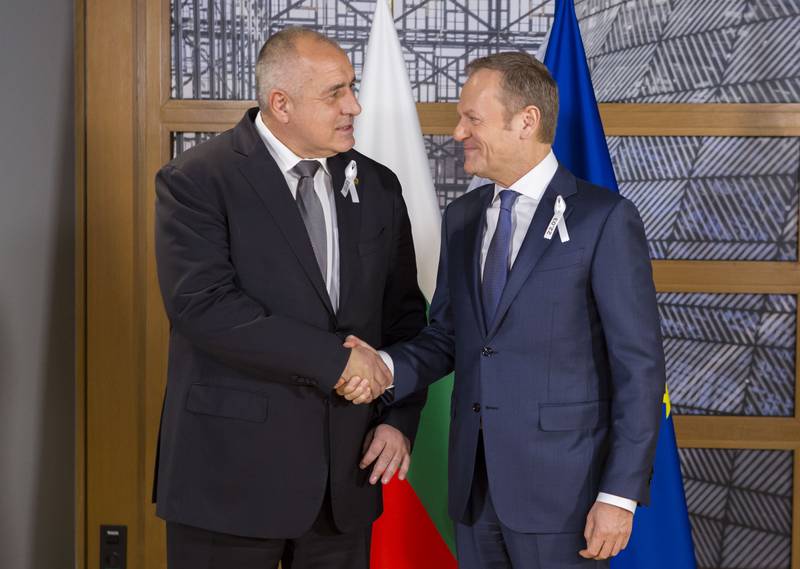 Boyko Borissov, Donald Tusk | © Council of the EU
Boyko Borissov, Donald Tusk | © Council of the EU Boris Johnson | © Council of the EU
Boris Johnson | © Council of the EU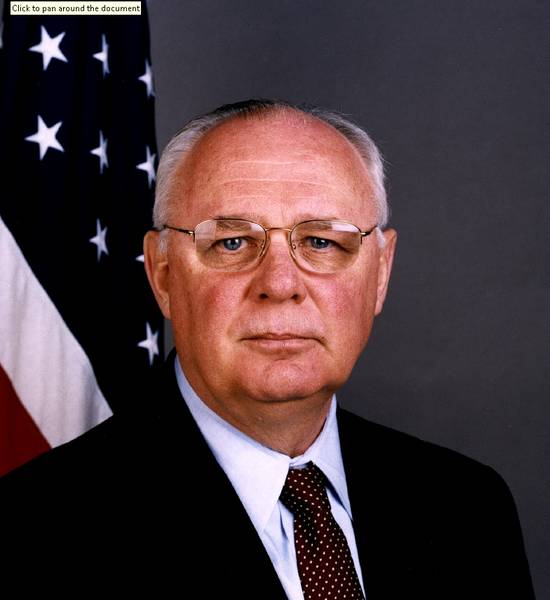 James W. Pardew | ©
James W. Pardew | ©